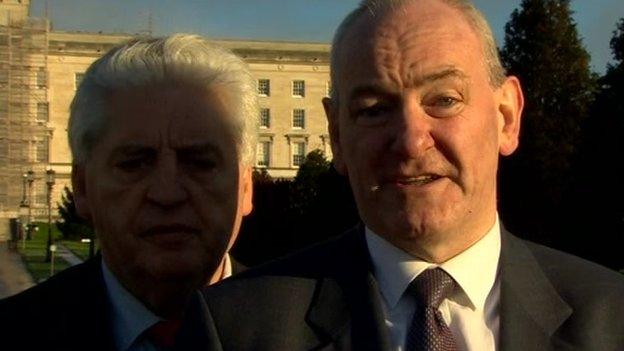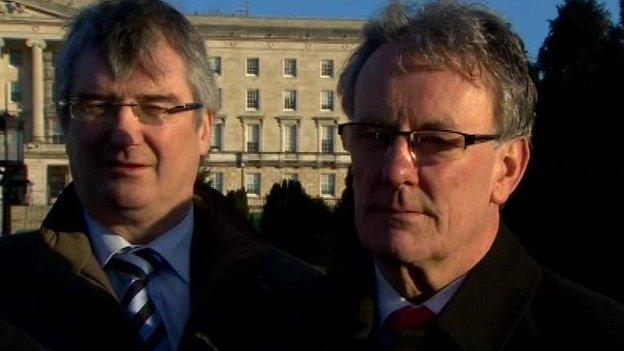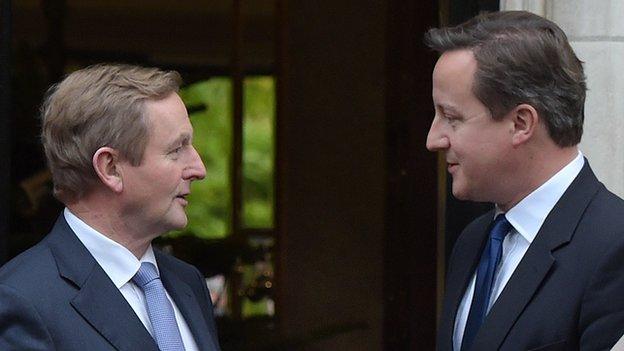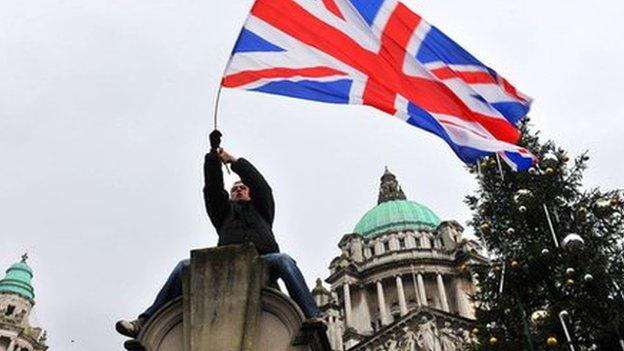NI talks: McGuinness says Cameron must supply proper financial package
- Published
David Cameron and Enda Kenny said they hoped the Executive could reach an agreement
Progress in Northern Ireland talks is impossible "without a creditable financial package," Deputy First Minister Martin McGuinness has said.
Prime Minister David Cameron left the talks saying that while a deal was not possible at this stage, he had offered £1bn of "financial firepower" for one.
The talks focus on disputes over flags, parades, the past and welfare reform.
First Minister Peter Robinson said Mr Cameron would have offered more if the parties were agreed on welfare reform.
Martin McGuinness: "We hope we can arrive at a place that we all can live with in relation to the past"
The DUP leader said he did not believe the parties had "sufficiently challenged the prime minister on what his bottom line is on financial issues".
"For our part the financial and welfare issues are central to resolving the current difficulties. It is essential that all parties remain focused if they are serious about delivering for the people of Northern Ireland," Mr Robinson said.
"The government must also commit to work towards an outcome that allows us to advance a stronger economy and recognises the challenges specific to Northern Ireland."
Stormont has not introduced welfare reforms passed by Westminster in February 2013. Sinn Féin has led the opposition to the reforms.
Mr McGuinness, who is a Sinn Féin assembly member, said: "In the 18 hours of his involvement in this negotiation, David Cameron made little or no contribution other than to duck his responsibilities and that of his government.
"There was no credible financial package on offer which would enable the executive to protect frontline public services or to deliver the type of peace and reconciliation work needed to stabilise the peace process."
Peter Robinson: "Yes the prime minister has more work to do, he needs to come up with a better package"
The parties were presented with an 18-page paper by the British and Irish governments on Thursday night, examining issues such as finance and welfare, flags, identity and culture, parades, the past and institutional reform.
Mr Cameron said: "I was prepared to put on the table real spending power, new spending power, for the Northern Ireland Executive to sort out some of the issues that it faces.
"Spending power, if everything was agreed, potentially of as much as £1bn.
"But a deal hasn't been possible. What I hope will happen now is the politicians here in Northern Ireland will work together to agree these vital issues about parades, about flags, about the past, about their budget."
Taoiseach Enda Kenny said he believed the document put in front of the political parties on Thursday night addressed all of the issues.
Speaking after leaving the talks on Friday morning, Mr Kenny said the governments would continue to be available to the parties, but he believed the Northern Ireland politicians would be able to "conclude the outstanding issues".

Analysis: Mark Devenport, BBC NI political editor
The Stormont politicians say they will continue their discussions, and Northern Ireland Secretary Theresa Villiers and Irish Foreign Minister Charlie Flanagan indicate they are ready to assist the process in the coming days.
However, given the gulf between the financial assistance that the Stormont politicians are demanding and the borrowing facility being offered by the UK government, it is hard to see the conditions for a deal emerging soon.
If the deadlock persists over crunch questions like welfare reform, the danger will be that the Northern Ireland Executive cannot balance its budget.
In that scenario, we could see a threat to the stability of the assembly or a move towards an early assembly election, perhaps in tandem with the Westminster election due in May 2015.

Stormont sources say the bulk of this extra £1bn consisted of reassigning the Northern Ireland Executive's current borrowing power, known as the Reform and Reinvestment Initiative.
That facility currently allows Stormont to borrow £200m per year for new capital build projects.
It is understood the prime minister proposed that a full £200m could be diverted in the first year towards funding a voluntary exit or civil service redundancy scheme, and £100m for five successive years, adding up to around £700m in total. This is why Stormont politicians are describing the cash as their own money.
The prime minister has also offered an extra £10m per year for four years to fund a proposed new Historical Investigations Unit, while a Downing Street source said it also included £100m in access to reserves and £140m of assistance for payment of fines.

What's in the document?
The parties were presented on Thursday night with an 18-page document, Paper for the Parties, A Draft Agreement at Stormont.
Seen by the BBC, the document has seven sections and examines issues such as finance and welfare, flags, identity and culture, parades, the past and institutional reform.
Much of it relies on ideas contained in proposals from talks chaired by former US diplomat Richard Haass that ended without agreement last December.
There is mention of a 15-member 'Flags and Culture and Identity Commission', which would report in 18 months' time.
There is also reference to a new Historical Investigations Unit, which was included in the Haass proposals.
On parading, the document states that powers should in principle be devolved to the Northern Ireland Assembly. It says the Parades Commission would remain the body for adjudicating contentious parades until new legislation is in place.
The final section of the document looks at how any potential agreement could be reviewed.


SDLP MP Mark Durkan (right) said some proposals from last year were being diluted

UUP leader Mike Nesbitt (right) said he believed a deal was still possible
Mark Durkan of the nationalist SDLP said the prime minister's offer contained "essentially no new money", adding that much of the progress made in last year's cross-party talks, chaired by former US diplomat Richard Haass, was "being diluted".
Ulster Unionist leader Mike Nesbitt said he still believed a deal was possible over the Christmas period, if the political will was there, but it "needs to be fixed urgently" as proposals to transfer corporation tax powers to Stormont were "hanging by a thread".
Alliance Party leader David Ford said there was "a need for realism and to seriously engage with the issues in the government's paper".
Further round-table talks on the past and financial matters were held on Friday afternoon.
British and Irish sources say the negotiations will reconvene next Wednesday and Thursday, while the parties may hold meetings before that.
The first and deputy first ministers are due to speak to Mr Cameron again in London on Monday, at a meeting of the Joint Ministerial Committee which brings together the UK government and the leaders of Northern Ireland, Scotland, and Wales.
- Published12 December 2014
- Published12 December 2014

- Published12 December 2014
